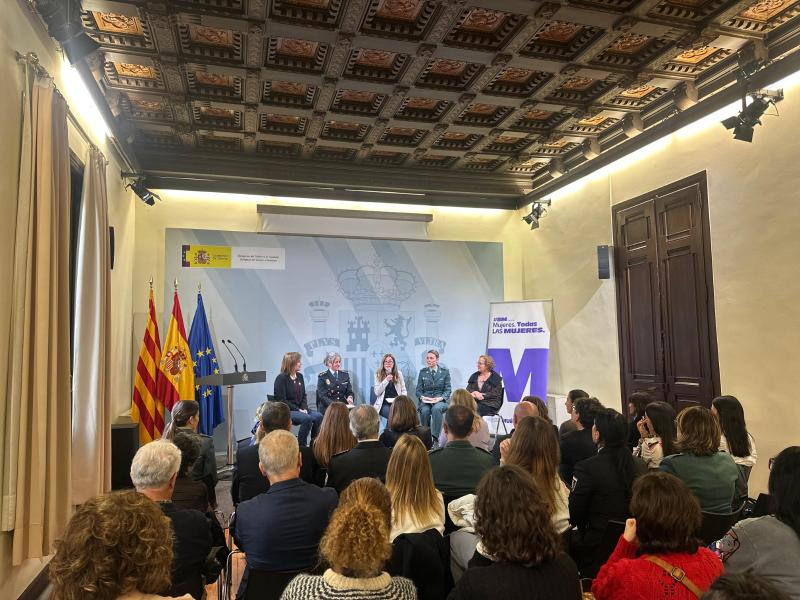- Highlight the conciliation measures of the public administration, although they insist that there is still a way to go
- Underline government measures to promote access to leadership positions, a path marked by pioneering women years ago
- 41.6% of AGE posts are held by women, when 30 years ago they represented 14%
Barcelona, March 7, 2024.- The government delegation in Catalonia has organized, this Friday, a round table under the title ‘AGE in violet: breaking the glass ceiling’, on the occasion of the celebration of 8M in which women with positions in institutions that depend on the General Administration of the State (AGE) have participated.
The talk moderated by the subdelegate of the Government in Barcelona, Mari Carmen García Calvillo, was attended by the provincial commissioner of Girona of the National Police, Juana María Gutiérrez, the lieutenant of the information section of the Civil Guard, Sonia Hurtado, the territorial director of the labor inspection and Social Security of Catalonia, Concha Pascual, and the director of Health and Social Policy, Carmen Aramburu. The closure and the conclusions of the debate were carried out by the Government’s subdelegate in Tarragona, Elisabet Romero.
POLICE CORPS
In her speech, the provincial commissioner of Girona defended the advances experienced by the National Police force in terms of gender and said that the future challenge is for women to continue to have visibility, “much more than has been achieved in the last 30 years”. “The role of women should not be residual,” he said, adding that in the body women “do not walk alone, they do so supported by many women, but also by many men.” “There’s no turning back, the woman walks forward,” he said.
Together with the Commissioner, the Lieutenant of the Civil Guard Information Section has highlighted the role of the pioneering women who joined the body at the time when women were allowed to do so, who have led the way for the rest by now making them feel integrated as full body members. Thus, he has called for the normalization of the presence of the woman in the positions of responsibility, “that it is seen with normality that there is a provincial commissioner and that it is not news; that a patrol with an Urban Guard is seen and not news; that a lieutenant colonel arrives to be head of Command and not news”. “When that is the case, then equality will have been achieved,” he said.
AGE MEMBERS
Carmen Aramburu described her experience in the international arena before entering the AGE -- where cross-cutting equality measures were applied -- and how she observed when entering the General Administration of the State that these measures were being applied in a “very advanced” way, especially at the conciliation level.
He explained that he was struck by the parity within the positions of responsibility, although he warned that many of these women “have had to put aside their personal lives.” For this reason, he has emphasized the need to educate in co-responsibility from schools and universities.
From the workplace, Pascual recalled that from 1985 until the beginning of “serious equality policies, management positions were occupied by men.” “In recent years, there have been significant changes,” he said and stressed that we must continue along that path, because much remains to be done.
He has also stressed that, in the AGE, seeing a table of people with responsibility “where there are only men, surprises”, and has warned of the importance given to the relationships that occur within the work, that generate relationships of trust and that, later, translate into proposals to occupy positions. Women have their own way of relating to each other and they have to be respected and they are just as valid as the others.”
SUBDELEGATES
García-Calvillo said that this day framed in 8M “allows us to reflect on the progress made, but also on the challenges that remain to be achieved”. “I’ll give you an example: 41.6% of AGE management positions are held by women, this at the end of 2024, but 30 years ago, in 1995, we represented only 14%. This shows the progress that has been made, but also what remains to reach 50%,” he concluded.
It has also set the example of the European Gender Equality Index. In this sense, he explained that Spain obtained, in 2024, a score of 76.7 out of 100, with 1 being the maximum inequality and 100 being the absolute parity, which shows, according to García-Calvillo, that Spain is “above the average, but still remains to reach 100%”.
Finally, the Subdelegate of the Government in Tarragona has defended the policies of the Government of Spain that “promote equality, the access of women to leadership positions and the conciliation between work and personal life”. Romero has advanced that the executive will continue “to work so that future generations of women do not find limits where there should only be opportunities.” “So that being a woman never poses a barrier to professional development,” she said and defended that the General Administration of the State must continue to be “an example of equity and social justice.”
